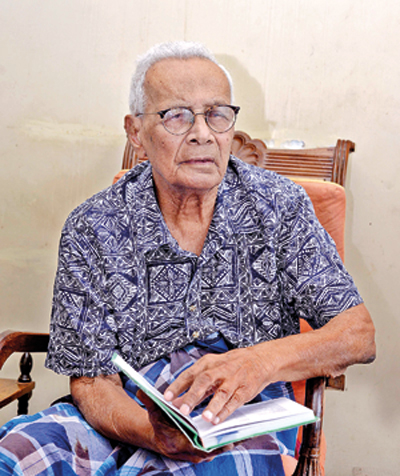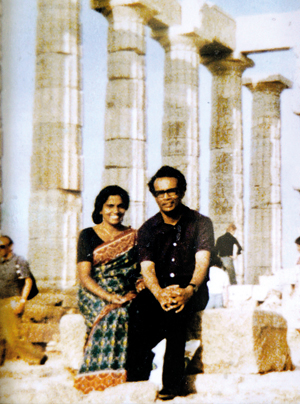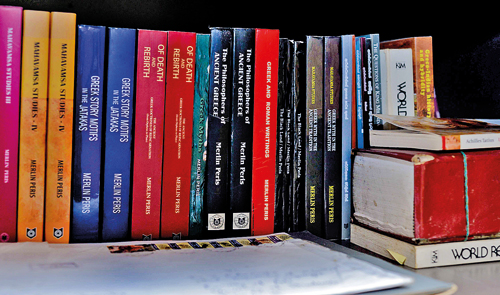Merlin the classics wizard’s odyssey

A lifetime with books: Emeritus Professor Merlin Peris at home in Dangolla. Pic by Eshan Fernando
Prof. Merlin Peris’s little house in Dangolla, Kandy is his own Arcadia, where, after a long romance with the Peradeniya University (his second love, after wife Kshanti) he has retired.
He still has emeriti ties with the old place where he spent a lifetime of classical scholarship, proving wrong the great Sir Ivor Jennings who once declared: “A Classics PhD is impossible for a Sri Lankan; it is a thoroughly ploughed field.”
The first Sri Lankan to acquire a doctorate in Classics, the professor now 91, has written more than 50 books, a number of them not limited to the standard textbooks and translations, but comparative studies that weave glorious arras, with such diverse interests as Ceylon history, wildlife and the classical world’s encounter with our East.
A great bubble chandelier dominates Prof Merlin’s bungalow scattered with books. Here are cluttered memories in photo – including mementos of the friendship he enjoyed with cousin J.R. Jayewardene, and a few images on holiday in Greece against the Ionic columns from the world of The Iliad and The Odyssey, that epic Mediterranean world he loved, as Sri Lanka’s premier classicist after the old generation of dons like Cuthbert Amerasinghe, J.L.C. Rodrigo, George Wickramanayake and Roland C. Pathmanathan.
While he would demur that there is ‘nothing to write about me’, a whole phalanx of stories unfolding like a sepia album – absorbing, emblematic of an era- proves otherwise.
Merlin’s ancestors were compradors whose story Kumari Jayawardene so assiduously recorded in her book ‘Nobodies to Somebodies’. They were “renda-raalas”, arrack renters who would go on to be local grandees.
Merlin’s father was chief clerk at Aitken Spence and they lived in comfort near S. Thomas’ College Mount Lavinia at Watarappola Road. In those balmy days sandwiched between the two wars and the heady sea breezes, cricket ruled.
When the Second World War came, Merlin left S. Thomas’ for Nalanda College and after the air raids and ‘excitement’ had ceased, resumed schooling at St. Peter’s.
Merlin’s first brush with classics was providential, and came at age ten.
He kicked open a coverless book lying on the corridors of the school by the sea and was sucked in inexorably by the lines “You wine sack, with a dog’s eyes”. It was The Iliad, and Merlin’s fate was sealed- he would forever be lost to that warm Mediterranean wine.

Snapshots from the past: Merlin with wife Kshanti in Greece
It is with a guffaw that Prof Merlin recalls being Junior Mr. Ceylon in the ‘forties when Dougie Roberts was all the boys’ hero – though they were all really ‘katu witharai’ (only bones).
Greek was taught at the bana maduwa (preaching hall of the temple) and one imagines Merlin, fighting in his head the witch Circe and the giant Polyphemus behind horn rimmed glasses.
Merlin was an undergraduate at both Colombo and Peradeniya as the university then changed its seat. Shifting to Peradeniya, he was asked which hostel he preferred and why. He said the James Peiris Hall because it was his namesake. “But the real reason,” he admits laughing, “was that it was close to the Hilda Obeysekere where my girlfriend was.”
Young Merlin and Kshanti were among the first couples to know romance in that dreamy setting against Hantane and the lush flora, the Mahaweli and the campus corridors.
Like with most successful academics Merlin’s life was governed by the hermetic discipline born of books and austerity. It was no surprise when he earned a rare First Class Honours in Classics (subjects – Greek and Latin); the papers were marked rigorously in England.
There was to be an interlude (not very enthusiastic) in the Ceylon Civil Service after graduation serving in Kalutara, Batticaloa and Polonnaruwa.
It was Stanley Kirinde, a good friend, who informed Merlin that the Classics Department had advertised for an assistant lecturer. So began in 1959 a legendary career, at Peradeniya save for the five years when he had to serve the Vidyalankara campus (1974 to 1980), where he used to get down from the bus with heavy tomes under his arms and stride up the hill (there were no classics books then at the fledgling campus).
England in the early 1960s was a strange place where the old graciousness was replaced by a lot of leg and lipstick. Here came Merlin for his Masters and PhD at the University of London.
He still recalls the panic he felt when searching for lodgings one night – knowing that his young family (wife, son and daughter) was already on a ship to join him soon- and he knew no one in London. He would ring the bell at one place which advertised rooms – only to hurry away when he saw a further notice coyly asking to “Ring twice for Dolores”!
Finally they lodged with his professor, D.M. Balme, though at the princely sum of 5 pounds a week.

Merlin’s books: He has authored more than 50
Over the years, it was Greek drama that has been Merlin’s forte. He introduced Sri Lankan readers to many comedies (while everyone was concerned with tragedies), and it is thanks to him that Aristophanes is today well known in Sri Lanka.
When the late Sirancee Gunewardene (the first Sri Lankan principal at CMS Ladies’ College) was the editor of Loris, the journal of the Wildlife & Nature Protection Society, she would rope in Merlin to author numerous pieces, including ‘Wildlife in the Jatakas’ and ‘Of Elephants and Frogs’.
For elephants he has had a soft spot always – and one of his volumes of comparative studies, titled ‘Mahavamsa Studies- Kandula: the Elephant at War’ was born of the sentiment that while history boasts many elephant heroes (from Dutugemunu’s Kandula to Hannibal’s Surus) no academic study has ever honoured these pachyderms.
Prof Merlin does not believe that Euripides or Menander need to be enjoyed essentially in the original. “It doesn’t matter whether you get your classics in the first hand or second hand,” he reiterates. That it is the essence not the cadences that matter, he holds strongly.
With restricted Sinhala, Merlin always needed an editor for the Sinhala books on classics he churned out, but he made sure they found their way to be the diet of the casual reader.
One of Merlin’s later academic breakthroughs was when he revealed that the Yonakas of Anuradhapura, from the Mahavamsa, were some of Alexander’s doughtier men who went further south than any fellow Greeks did – and this during Alexander’s own time.
These days – unfortunately no longer academically active- the harmonica is his friend and he obliges me with a lively playing of “There’s no place like home”. His late brother Reggie was a musician who played with Sunil Santha while another brother was with Amaradeva after finishing off at Santiniketan.
As we linger in his book-lined cosy nest in Hantane there are many more nooks and crannies of memory to explore (like the story of the academic wrangle over a leopard called ‘yuga-diviya’) but as his nurses are getting edgy we say goodbye to this gentle scholar who, despite being able to talk weather as well as philosophy in Greek and Latin, always wore scholarship lightly, and popularized heartily – what others sought to guard as ivory towers of privilege.


